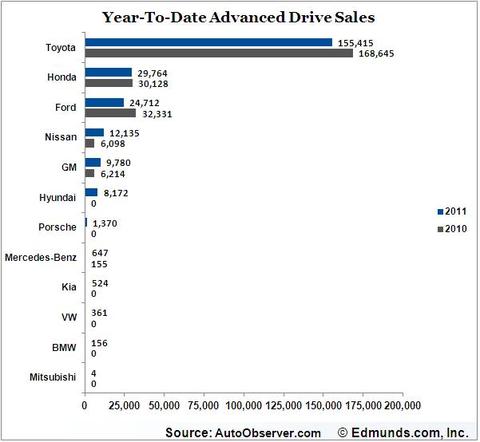rickyp wrote:Ricky defends them with several poorly organized arguments that we then have to refute.
You've never once responded to the arguement that subsidies to the Volt help GM compete with foreign entrants .
Actually, I both anticipated it (when I wrote, "Get ready for a cut and paste fusillade about how the Asian tigers subsidized it and have stolen the market. . . .For the 8th time"), but I also posted a chart showing how helplessly behind GM is. How many billions should government waste trying to capture a niche market?
Oh, that and the fact that the entire automobile manufacturing industry have decided that the development of the electric car is inevitable, whatever you and Steve have to say about it.
Technically, not correct. Some companies don't have said vehicles.
What would happen if the government was not subsidizing them? Would they be inevitable given their current inefficiencies and deficiencies? I think they would still be in the development phase, which is where they belong.
I'll accept that they, as an entire industry, have considered the issues of electrical supply, batteries etc. And that they don't expect them to be game enders as you seem to think.
Why do you accept this? Why is it a given? What evidence do you have that GM is concerned with the impact on the power grid?
Archduke Russell John wrote
:So if this is the case, which I believe it is, why does the purchase of EV's require such a large Federal Gov't subsidy? If the market is there for the product why subsidize it?
In order to provide the American manufacturer with an advantage in the market that helps them move through the develpment stages of the commercialization of their product faster than the foreign competitors.
Oh, that explains why the Nissan Leaf gets subsidized now. That also explains why the Prius was subsidized.
You don't get it. In the end, it's not about helping American companies, although GM is an interesting case, it is about creating an illusion that "green" cars are a present reality. For some people, they may work and they may be willing to pay for the vehicles in spite of their limitations. There is no reason for the rest of us to have to subsidize them. None.
By providing the product with a cost advantage that allows them to gain enough sales so that their engineering and marketing teams can do the analysis and product development that will allow them to gain market share as the market segment develops.
Look back at the chart I posted. I thought a picture might help you understand--sales are not advancing. Gray is 2010; Blue is 2011. Most companies are selling fewer. Has it ever struck you that the market for these vehicles will never be broad--until and unless performance and price make them competitive?
And Steve; The Wright Brothers? really? Will you next be complaining that the Stanley Steamer received no support?
Hey pal, you brought them up, not me. I just responded to your blather, so let it go.
Its more relevant to ask what of the American aerospace industry.
Okay, why did you mention the Wright brothers then?
Edit: to be clear, you wrote:
10 years ago their were |It'll never fly Orville" types like you saying many of the same things about the ealiest hybrids and they now make up a significant segment of the market.
If that wasn't about Orville Wright, then I have no idea whom it was about.

